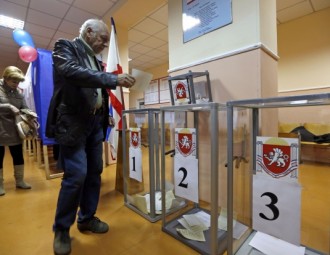Crimea holds illegal referendum on whether to join Russia
 photo by REUTERS
photo by REUTERS
Being held at the gunpoint, the referendum is not recognized by Ukraine, Venetian commission, EU and US.
The referendum is expected to pass in Crimea where Russians make up about 60 percent of the population. Ethnic Tatars and many Ukrainians are expected to boycott the vote.
The referendum ballot features two questions: One, to grant Crimea greater autonomy within Ukraine. The other - which is expected to garner the most support - envisions annexation by Russia.
According to ITAR-TASS an extremely high turnout is reported at a referendum in Crimea immediately after polling stations opened. According to observers, people have even lined up at some polling stations, but election committees are doing their best so that coming voters will have an opportunity to vote calmly.
Representatives of district and territorial election committees also confirmed a high turnout. They also stated that they were fully prepared to provide for voting of all local residents.
The United States and European Union have already vowed to take tough action if Russia acts on the results of the referendum, recalls RFE/RL.
Russian Foreign Minister Sergei Lavrov has said Moscow will "respect the will of the Crimean people."
On the eve of the ballot, Russia vetoed a UN Security Council resolution declaring the referendum to secede from Ukraine invalid. Thirteen nations voted in favour and Moscow ally China abstained.
"Russia cannot change the fact that moving forward in blatant defiance of the international rules of the road will have consequence, nor can it change Crimea's status. Crimea is part of Ukraine today, it will be part of Ukraine tomorrow, it will be part of Ukraine next week, it will be part of Ukraine unless and until its status is changed in accordance with Ukrainian and international law," U.S. ambassador Samantha Power said.
-
03.01
-
07.10
-
22.09
-
17.08
-
12.08
-
30.09










































